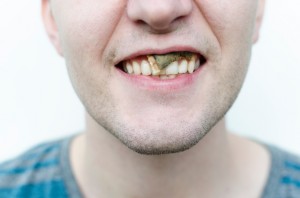 Your oral health is closely linked to your overall well-being, and we’re learning more about the tie between the two every single day. Great strides were made in 2015 in understanding the cyclical connection between periodontitis, or gum disease, and a number of other conditions in the body. It seems that in many cases, gum disease left untreated can cause other diseases to worsen, too. Heart disease is just one of these conditions. Keep reading to learn more about the condition (and periodontal therapy in Beachwood!) from Dr. Hornstein today.
Your oral health is closely linked to your overall well-being, and we’re learning more about the tie between the two every single day. Great strides were made in 2015 in understanding the cyclical connection between periodontitis, or gum disease, and a number of other conditions in the body. It seems that in many cases, gum disease left untreated can cause other diseases to worsen, too. Heart disease is just one of these conditions. Keep reading to learn more about the condition (and periodontal therapy in Beachwood!) from Dr. Hornstein today.
Category: gum disease
Poor gum health linked to heart disease, says Beachwood dentist
January 22, 2016
The Dentist Pepper Pike Prefers Says Tobacco Use Greatly Affects Oral Health
September 16, 2015
 Tobacco use is rampant in the United States. Roughly 42 million people are habitual tobacco users. Of this number, many will develop conditions such as lung cancer, emphysema and more. Tobacco is enjoyed by people in several different ways including cigarettes, smokeless tobacco (“dip”), or cigars. Nicotine is highly addictive, which explains why so many people are tobacco users. We’re here to tell you that it’s in your best interest to kick the habit while you still have time. You see, it isn’t just your overall health you’re putting at risk, it’s your oral health, too. Our Beachwood, OH office wants you to know that your oral health is very important and tobacco use can leave it in bad shape. Bad oral health has a major impact on your overall health. As the Beachwood dentist of choice for residents in the area, Dr. Hornstein has firsthand the effects tobacco has had on many patients. He and the rest of our dental staff want you to live your life free of tobacco and with the best oral health of your life.
Tobacco use is rampant in the United States. Roughly 42 million people are habitual tobacco users. Of this number, many will develop conditions such as lung cancer, emphysema and more. Tobacco is enjoyed by people in several different ways including cigarettes, smokeless tobacco (“dip”), or cigars. Nicotine is highly addictive, which explains why so many people are tobacco users. We’re here to tell you that it’s in your best interest to kick the habit while you still have time. You see, it isn’t just your overall health you’re putting at risk, it’s your oral health, too. Our Beachwood, OH office wants you to know that your oral health is very important and tobacco use can leave it in bad shape. Bad oral health has a major impact on your overall health. As the Beachwood dentist of choice for residents in the area, Dr. Hornstein has firsthand the effects tobacco has had on many patients. He and the rest of our dental staff want you to live your life free of tobacco and with the best oral health of your life.
(more…)
Oral Health & Pregnancy Facts from Your Beachwood Dentist
July 15, 2015
 It’s no secret that your body changes when you’re pregnant. Hormones rising and falling, morning sickness, aches and pains, and more can make you feel like your body is out of control. Many patients aren’t aware of how hormonal variation during pregnancy can effect oral health. At the Center for Advanced Dentistry (CFAD), our skilled team will explain the ins and outs of the changes in your oral health while pregnant. If you are pregnant or trying to get pregnant, call to schedule an appointment at our Beachwood, OH office to review oral health and discuss recommended changes to your hygiene routine.
It’s no secret that your body changes when you’re pregnant. Hormones rising and falling, morning sickness, aches and pains, and more can make you feel like your body is out of control. Many patients aren’t aware of how hormonal variation during pregnancy can effect oral health. At the Center for Advanced Dentistry (CFAD), our skilled team will explain the ins and outs of the changes in your oral health while pregnant. If you are pregnant or trying to get pregnant, call to schedule an appointment at our Beachwood, OH office to review oral health and discuss recommended changes to your hygiene routine.
Oral Health Changes While Pregnant
The change in hormone levels puts women at high risk for gum disease, specifically a form of gingivitis referred to as “pregnancy gingivitis.” Thorough at home hygiene and regular six month dental cleaning may not be enough to prevent this form of gingivitis. If you notice inflamed, bleeding or swollen gums, gum sensitivity when eating or drinking, or excessive bleeding when flossing or brushing your teeth, call CFAD immediately. Depending on the severity, we may recommend more frequent cleanings through the course of your pregnancy. Gum disease during pregnancy increases the risk of pre-term birth and underweight babies as well as potentially compromising the baby’s and your immune system if infection enters the blood stream.
Another oral health change noticed while pregnant is the “pregnancy tumor.” The name is quite misleading. A pregnancy tumor is not cancerous. The changes in your body make the mouth’s soft tissue more sensitive to irritation from plaque buildup or foreign debris. These red lumps usually appear on the gums between teeth. If they are extremely painful or impede eating, we may recommend removal, but the tumors typically clear up on their own after you give birth.
Dental Care for Baby from the Dentist Shaker Heights Trusts Most
Did you know your baby’s teeth begin to develop between the 3rd and 6th month of your pregnancy? A healthy diet is essential to a healthy pregnancy, but did you know that eating well can help your baby develop stronger, healthier primary teeth? Your baby needs a lot of vitamins and minerals throughout the pregnancy, but their developing teeth especially need large amounts of Vitamins A, C and D, calcium, protein and phosphorous. Taking a prenatal vitamin as prescribed or recommended by your physician can help you absorb a large percentage of these necessary nutrients, but eating high fiber and protein, and calcium rich foods will provide your baby with more of the necessary nutrients for growth, especially for developing healthy teeth.
Most necessary dental health care is perfectly safe for pregnant and lactating mothers. However, elective procedures should be postponed until after your pregnancy. In the case of dental emergency, more complex restorative procedures may be necessary, but should always be performed in conjunction with your physician.
Contact Your Family Dentist, 44122
At the Center for Advanced Dentistry, we are here to care for you at every stage of your life. If you’re pregnant or trying to become pregnant, call to schedule an appointment to discuss tips for optimal oral hygiene while pregnant. Our Beachwood, OH practice welcomes patients from the surrounding area Shaker Heights, Pepper Pike, Warrensville Heights, Cleveland, and the neighboring communities
Kiss Chronic Bad Breath Goodbye
July 15, 2011
 Do you try to masque chronic bad breath with gum or mints? Those may help, but they don’t really treat the problem. Odds are, your recurring bad breath has something to do with your brushing habits, and it may even be a symptom of a serious problem.
Do you try to masque chronic bad breath with gum or mints? Those may help, but they don’t really treat the problem. Odds are, your recurring bad breath has something to do with your brushing habits, and it may even be a symptom of a serious problem.
Bad Breath – It’s Causes and What It Might Mean
One reason why some suffer from bad breath, also known as halitosis, is because of poor brushing habits. When you forget to brush (or floss), food particles can become trapped in your teeth, where they decay and mix together with bacteria to form a sulfur compound.
But your bad breath may not just be caused by old bits of food. In some cases, halitosis may a symptom of gum disease. Which mean, if you suffer from chronic bad breath and mints, gums, and brushing aren’t helping, you may want to schedule an appointment with Dr. Hornstein. He’ll put your smile through a comprehensive exam to look for any other symptoms that might indicate the presence of the disease.
If we find any, Dr. Hornstein can recommend a treatment process that will help you. Gum disease can often be treated by spending more time at the sink and with more regular dental visit. We may also recommend a professional kit like CloSYSII or a tongue scraper to help you.
Cleaner Breath and a Healthier Smile
To find out more about how Dr. Hornstein can treat bad breath, or to schedule a consultation visit, give us a call today. Our Beachwood dental office serves patients from Cleveland, Solon, Shaker Heights, Pepper Pike, and beyond.
Don’t Forget to Floss
May 26, 2010
Dental experts overwhelmingly agree that daily flossing is a critical, preventive step in reducing tooth decay and gum disease. Flossing removes plaque between teeth and below the gum line — dislodging the pieces of food trapped between teeth which otherwise cannot be brushed or rinsed away.
Plaque build up causes gum disease (gingivitis) which affects some two- thirds of the U.S. population, while advanced-stage gum disease (periodontal disease) is the leading cause of tooth loss in American adults and affects between ten and fifteen percent of the U.S. population.
To receive maximum benefits from flossing, use the following proper technique:
- Starting with about 18 inches of floss, wind most of the floss around each middle finger, leaving an inch or two of floss to work with
- Holding the floss tautly between your thumbs and index fingers, slide it gently up-and-down between your teeth
- Gently curve the floss around the base of each tooth, making sure you go beneath the gumline. Never snap or force the floss, as this may cut or bruise delicate gum tissue
- Use clean sections of floss as you move from tooth to tooth
- To remove the floss, use the same back-and-forth motion to bring the floss up and away from the teeth



(Photos courtesy of Colgate.com)
When you are flossing, you are doing a great service to your mouth. You can easily remove food that is stuck in between your teeth, not only saving you from potential embarrassment if people see it, but also to help prevent bacteria from collecting up against the gum line and causing gum problems. Flossing may even help prevent bad breath. In addition, having food stuck in between your teeth is quite irritating and sometimes painful, so flossing can help your mouth feel comfortable.
Gum Disease and Your Overall Health
April 8, 2010
The American Academy of Periodontology (AAP) estimates that approximately three out of four Americans suffer from some form of gum disease — from mild cases of gingivitis, to the more severe form known as periodontitis. However, despite this prevalence, approximately only three percent seek treatment for their gum disease. With increasingly more research indicating that gum disease may be linked to several other diseases, including diabetes, heart disease and certain forms of cancer, maintaining healthy teeth and gums has become more important that ever.
According to Samuel Low, DDS, MS, Associate Dean and professor of periodontology at the University of Florida College of Dentistry, and President of the American Academy of Periodontology, the discrepancy between the prevalence of gum disease and the lack of treatment can likely be blamed on a lack of understanding of the effect periodontal disease can have on overall health. “Patients do not always seek the periodontal care they require because they are not aware of the long-term and potentially dangerous implications of untreated gum disease,” says Dr. Low. “Unfortunately, there are a variety of myths surrounding periodontal disease and its repercussions.”
In order to help distinguish between fact and fallacy regarding periodontal disease, the AAP has identified and addressed below some common misconceptions about oral health.
1. Bleeding gums are not that big of a deal. Red, swollen and bleeding gums are an important sign of periodontal disease. If you notice bleeding while brushing or flossing, or when eating certain foods, you should schedule a visit with your dental professional to be evaluated for periodontal disease. Studies have shown that in addition to tooth loss, gum disease may contribute to the progression of other diseases, including heart disease and diabetes, so it is important that you begin treating periodontal disease as soon as possible.
2. You don’t need to floss every day. Routine oral care, which includes brushing after every meal and before bedtime, and flossing at least once a day, is the best way to prevent gum disease. However, a recent survey estimates that only 13.5 percent of Americans floss each day. It is vital that you keep up with your daily oral care, and see a dental professional for a thorough check-up twice a year. If gum disease is diagnosed, a consultation with a periodontist, a dentist who specializes in treating periodontal disease, may be beneficial.
3. A visit to the periodontist will be scary. Periodontists are gum disease experts. They have received three or more years of specialized training following dental school centered on the diagnosis, treatment and prevention of periodontal disease. Periodontists are equipped with the latest treatments and technologies, using innovative tools such as digital radiography, ultrasound technology, biomarker measurement and laser therapy to help make your visit more comfortable.
4. A tooth lost to gum disease is a tooth lost forever. Gum disease is a major cause of tooth loss in adults. However, in addition to treating gum disease, periodontists are also experts in placing dental implants — a convenient and comfortable way to permanently replace missing teeth. A dental implant is an artificial tooth root that is placed into the jaw to hold a replacement tooth. Studies have shown that dental implants have a 98 percent success rate, and with proper care, allow you to speak, eat and smile with confidence. In fact, a survey conducted by the American Academy of Periodontology found that over 70 percent of respondents reported being “pleased” or “extremely satisfied” with the results of their dental implants.
5. Poor oral hygiene is the only way to develop gum disease. Forgoing good oral hygiene can certainly contribute to the progression of gum disease, but there are a variety of other factors that can also impact your risk. For instance, tobacco use has been shown to greatly increase your chance of developing gum disease. Stress, poor diet, and even genetics, can also play a role in the health of your gums.
About the American Academy of Periodontology
The American Academy of Periodontology (AAP) is the professional organization for periodontists — specialists in the prevention, diagnosis, and treatment of diseases affecting the gums and supporting structures of the teeth, and in the placement of dental implants. Periodontists are also dentistry’s experts in the treatment of oral inflammation. They receive three additional years of specialized training following dental school, and periodontics is one of the nine dental specialties recognized by the American Dental Association. The AAP has 8,000 members world-wide.
Source: American Academy of Periodontology
Sign Your Dog Up For a Shot at Stardom
February 22, 2010
Below is the link from Pedigree Dog Food featuring their Dentastix Treats for your dog’s teeth. It is used to promote dental health in dogs. You can upload your own dog’s photo and create a funny view of what might happen if you don’t care for his teeth. Just a little humor to start your Monday.
